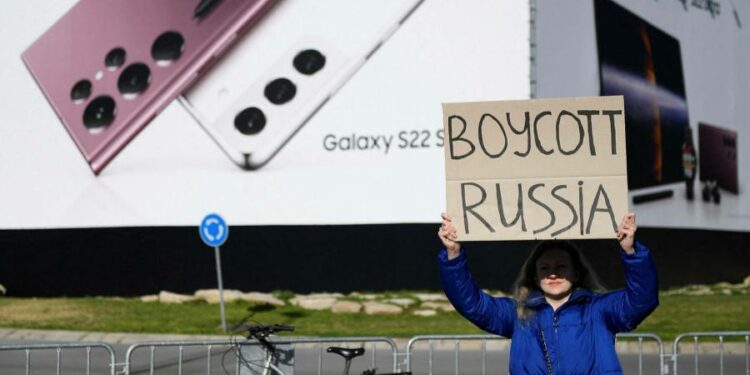European stocks and US futures dropped on Tuesday, government bonds rallied and oil prices rose sharply as traders weighed the global economic implications of Russia’s invasion of Ukraine.
Europe’s Stoxx 600 share index slipped 1.7 per cent, with all sectors in negative territory. Utilities shares, consumer cyclicals and financials were among the biggest fallers. The regional gauge is trading more than 8 per cent lower for the year and has swung since last week when western powers began launching sanctions against Russia.
Germany’s Xetra Dax dropped 2.7 per cent, France’s CAC 40 fell 2.9 per cent and the UK’s FTSE 100 lost 1.1 per cent. Shares in London-listed Russian gold producer Polymetal lost about a quarter of their value, having halved on Monday.
Futures markets implied the US’s S&P 500 share gauge would fall 0.7 per cent, with the technology-focused Nasdaq 100 also tipped to open lower.
Meanwhile, government bond prices rose significantly, particularly in the eurozone, as traders sought shelter from economic risk and also bet on the European Central Bank maintaining supportive monetary policies.
The yield on Germany’s 10-year Bund, a benchmark for borrowing costs across the eurozone, dropped 0.15 percentage points to 0.01 per cent, reflecting a significant rise in the price of the debt instrument. Italy’s equivalent bond yield fell 0.2 percentage points to 1.56 per cent.
“It’s a bid for safety and away from equity market risk,” said Antoine Lesne, head of research and strategy at State Streets SPDR ETF business. “But it also suggests that one of the key consequences of this conflict will be a gradual shift away from monetary tightening and rate hikes in the eurozone area.”
The ECB has not raised its main deposit rate since 2011. It has bought more than €1.6tn of eurozone government bonds under its pandemic emergency purchase scheme and had been expected to turn less accommodative to tackle record high levels of inflation.
But the eurozone economy faces greater risks from the Ukraine crisis than the UK and the US, economists have said, because of deeper trade links with Russia and heavy reliance on Russian oil and gas.
“Europe is bearing the brunt of the invasion’s initial impact, with higher energy costs hurting consumers and the level of sanctions pressuring European growth,” Jeffrey Schulze, ClearBridge Investments strategist, said in a note to clients. “Such headwinds could lead to a more dovish ECB.”
US government debt also rallied on Tuesday, with the yield on the 10-year Treasury note dropping 0.08 percentage points to 1.76 per cent.
Meanwhile, the price of Brent crude, the international oil benchmark, advanced 6 per cent to $103.9308 a barrel. Russia’s invasion of Ukraine has repeatedly driven oil prices above $100 a barrel this month. Russian output accounts for about 10 per cent of global oil production.
In Asia, Japan’s Topix share index rose 0.5 per cent and Hong Kong’s Hang Seng index added 0.2 per cent.
Additional reporting by Andy Bounds in Brussels











